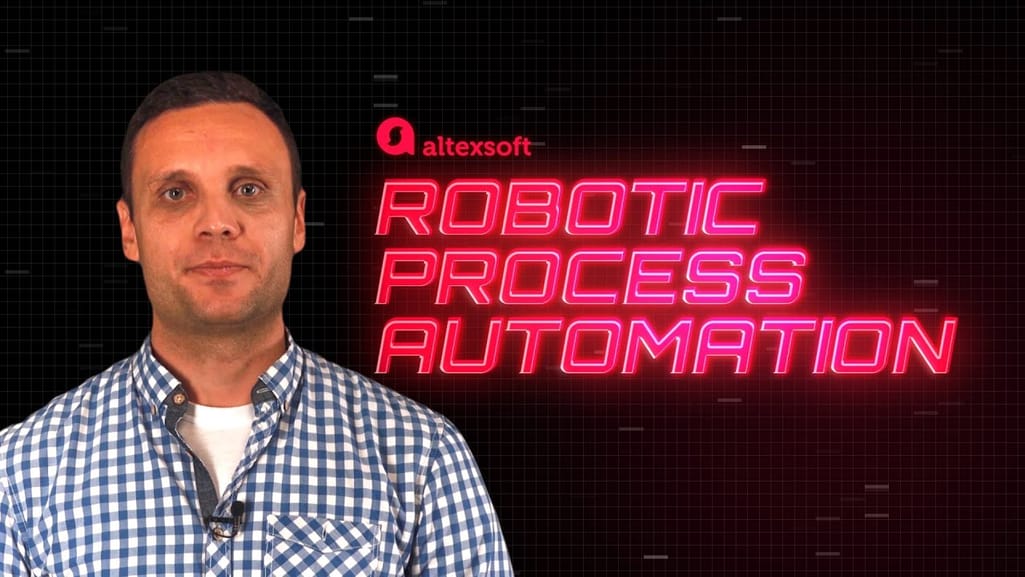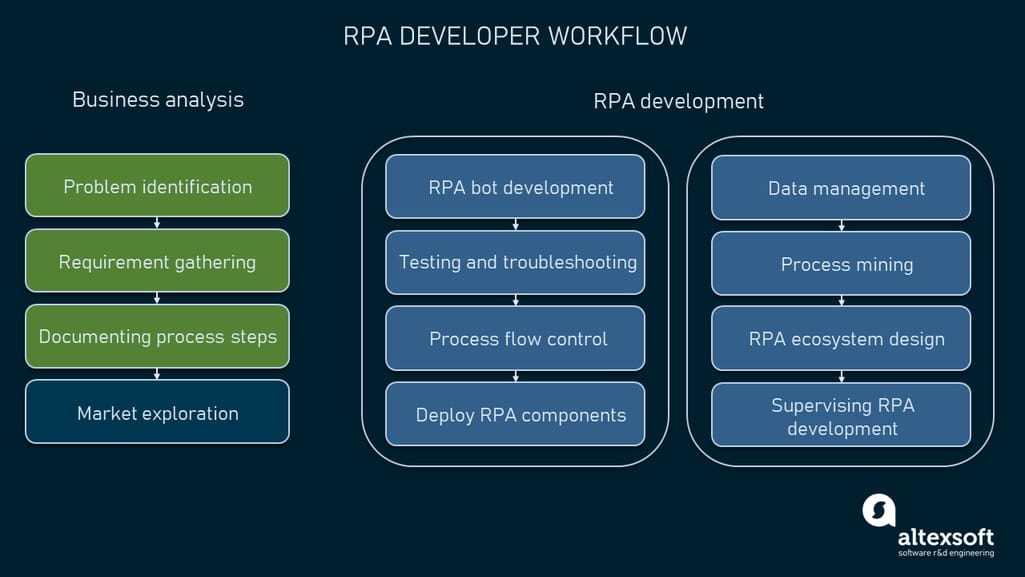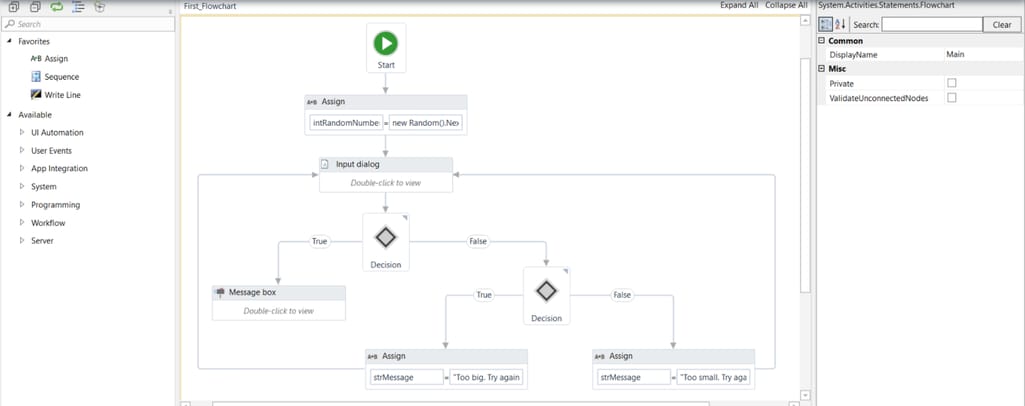A 2020 US Emerging Jobs report by LinkedIn provides interesting news in the Robotics Engineering sector: “Careers in Robotics Engineering can vary greatly between software and hardware roles, and our data shows engineers working on both virtual and physical bots are on the rise.”
While hardware robots remain in the realm of investment-heavy manufacturing, software robots became increasingly popular in office work due to the rise of Robotic Process Automation or RPA. As one of the fastest-growing industries according to Gartner, RPA led to the emergence of new professions. One of them is the RPA developer.
Given a growing interest in automation engineering, let’s take a look at the role of an RPA developer. In this article, we’ll analyze the typical duties, responsibilities, and skills this role has. Further, we’ll also discuss the certification required for employing or hiring an RPA developer.
What is Robotic Process Automation in a nutshell
To understand the role of an RPA developer, first, let’s provide you with some context on what RPA is. Robotic Process Automation is a practice of employing software bots designed to do routine business tasks. Data transmission or transaction approval are some of the most typical cases for RPA automation.


RPA in a nutshell
When a sequence of actions has a straightforward flow, like “download document >> change formatting >> upload to a destination folder,” we can apply an RPA bot to this process. The program memorizes the process steps and reproduces them over and over. And, mostly, these bots are designed for business users, so they don’t require any programming language to operate.
This is what RPA looks like in a nutshell. For a more in-depth look, check our articles on different aspects of this technology:
Robotic Process Automation technology overview
How AI is applied in Robotic Process Automation
Now, let’s move on to an RPA developer.
What is RPA Developer
An RPA Developer is a software team role that focuses on designing those automation bots. While the name includes the word “developer,” typical tasks don't match a typical software engineering routine, because an RPA developer uses the skills of a software developer, a business analyst, and a project manager.
RPA bots can be used on a large scale and automate thousands of processes at once. So, whenever we have more than ten bots, the technology starts to expand with its own servers, monitoring tools, and operation dashboards.
Depending on their experience level, an RPA developer will be responsible for programming the actual bots or designing the ecosystem for automation tools. The degree of management and architectural responsibilities will depend on the company’s priorities and RPA team size.
So, let’s have a look at the main RPA developer responsibilities to appreciate the full spectrum of their duties.
RPA developer responsibilities
The responsibilities can be split into phases of RPA development. The first phase includes the business analysis of a problem and the design of automation solutions. The second covers tasks on coding, testing, and maintaining both RPA bots and the entire ecosystem. Let’s explore each of the stages in detail.

RPA developer workflow split by business analysis activities, bot development, and overall ecosystem design
Business analysis duties
Problem identification. An RPA developer is in charge of exploring the opportunities for automation. Their responsibility is to reveal business processes that can be partially or fully automated with software to remove the manual burden and improve productivity. So, this will include analyzing the company's business domain, finding business-critical points, and learning what part of the flow can be automated.
Requirements gathering. When learning the specifics of the potential automation case, an RPA developer will gather the requirements from the end users. This is typically done via interviewing employees to reveal the pain points and steps in task completion.
Exploring off-the-shelf RPA systems. The RPA industry is highly developed and already has thousands of business processes covered out of the box. So, there might be no need to develop custom software to handle your business task. In this case, an RPA developer will be responsible for searching for an RPA solution and exploring whether this specific bot fits the business task.
Documenting business process steps. To automate the process, an RPA developer will learn the logic of the task and the actual steps it takes for an employee to complete it. They document this information to do more work with software development teams and create a bot design.
This set of responsibilities will be found in the majority of RPA vacancies. Most businesses need help with understanding the right fit for RPA software and want to find out if there is even a need for automation.
Now, let’s move on to the software development duties.
RPA development responsibilities
As we mentioned before, RPA software is often used on a large scale. This requires an RPA developer to design the corresponding ecosystem of tools to deploy bots, monitor their performance, and integrate them with the rest of the company’s technologies. So, as a software engineer, this role entails several responsibilities:
Process mining. Process mining is the practice of monitoring corporate processes using data. This technique was developed to optimize the implementation of RPA, as business processes are often interconnected and may complement one another. RPA developers often use process mining to build a strategy of automation and explore the most optimal implementation tactics.
Data management. A complementary part of process mining is data management. As the majority of business processes deal with data extraction, editing, and formatting, an RPA developer should understand how data changes. Any RPA system suggests its own methods on how to extract and label data from various sources. This aspect basically includes the following operations:
- data extraction methods,
- data cleaning,
- verification process,
- formatting, and
- data output configuration.
Process flow control. Put simply, every automation follows a strict sequence of actions each bot has to perform. Process flow automation is a general name for tools that help RPA developers build these flows and provide if/then statements, for example, “If the file has X format, form to Y format.”
But generally, action sequences have a more complex structure, which is why RPA developers need a control panel to build logical flows. This is one of the primary tasks in a general automation design.

RPA bot flow control. Source: UIPath
RPA bot development. This part includes designing and coding automation software for the documented business tasks. Some providers implement tools for visual scripting. This is basically a possibility for nontechnical users to create RPA bots without code knowledge. The user interface provides a drag-and-drop interface with in-built commands to design a flowchart the bot will operate on.
Testing and troubleshooting. As a part of quality control, RPA developers are responsible for keeping the bots afloat, finding, and solving code issues.
Designing an RPA ecosystem. An RPA system includes different tools either to provide a user with control over bots or administrate the digital workforce from a dedicated interface. An RPA developer is in charge of designing the ecosystem of tools, which often will include the following components:
- user interface – a desktop or web application that allows a business user to launch or stop the bot, modify its workflow, provide training, new rules, and other functionality;
- orchestration – an administrative dashboard for controlling multiple bots, monitoring performance and metrics, as orchestrators allow for modifying the bot workflow on a large scale and assign different tasks to separate groups of bots;
- training interface – for creating RPA bots to perform specific business tasks, for the most part a software that is an integrated module in a user interface or an orchestrator; and
- a physical or virtual server to deploy RPA software.
Keep in mind that coding the actual software is usually a collaborative task for the software engineering staff.
Deploy RPA components. Independent of the implementation type, RPA developers will support the deployment of automation software and ensure its reliability on any device.
Supervising RPA development. In case there is only one RPA specialist in a company, chances are they will act more as a tech lead or a manager for the development process. This entails close collaboration with other software engineers to communicate the requirements and manage RPA implementation.
Given this mix of business analysis and software development, a candidate for the role of RPA developer has to obtain a quite specific set of skills. So let’s talk about them.
RPA developer skills
While the knowledge of programming languages depends on the specific company tech stack, there are several things considered as must-haves for an RPA developer. Scanning through company vacancies, we can point out the following skills required most often.
Analytical skills. As a significant part of the job is bound to digging into internal processes, a business analysis background is generally required. This is vital for the correct understanding of the process flows and indicating opportunities for automation.
Problem solving. This is the case where problem solving is not just an item on a resume. Because RPA is designed to solve business problems, optimize budgeting, and resolve productivity issues. So you might pay attention to the candidates that have a business development background, coupled with RPA experience.
Strong communication skills. Soft skills are required to efficiently communicate between the end users, development teams, and other stakeholders. As an RPA developer acts both as a business analyst and software developer (or lead), their job entails significant amounts of communication and elaboration.
Understanding UX principles. Valid for any development role, this skill is very much required for RPA software. As the primary user group is business- not tech-related, interface and bot training should be as intuitive as possible to ensure successful integration into the workflow.
Process mining proficiency. As a specific part of RPA activity, a strong understanding of process mining is required for most RPA-related roles.
Programming language experience. Here, we’ll group the programming languages and frameworks that are often required to work with automation bots.
- Python is the most demanded scripting language for RPA, as various bots use scripts written on Python and some of its libraries.
- Visual basic, while considered a popular language for RPA on its own, some major vendors like Automation Anywhere and UIPath use VB as their main language.
- C/C# are another common group of languages for building desktop RPA software.
- .NET/ASP.NET are the frameworks for the C group of languages and Visual Basic. .NET is a platform of frameworks that allows for building both web and desktop cross-platform applications, and it’s a popular choice for writing RPA software on C/C#.
- JavaScript is often required for building web-based RPA. And it's also required for working with the Automation Anywhere ecosystem along with Visual Basic.
Experience with RPA tools. The majority of companies embracing RPA utilize standard solutions from RPA providers. As there are numerous out-of-the-box solutions, the position of RPA developer narrows down to implementing and maintaining technologies from the market. Nevertheless, experience with such tools is required even for senior positions, so we’ll put the most popular technologies on the list:
Now, we’ll look at a couple of non-RPA specific skills often valued when hiring an RPA developer.
Cloud technology knowledge. The majority of software businesses use cloud infrastructure for implementing their corporate software. While server configuration on AWS or Azure is not an RPA specific knowledge, such experience is often required to deploy bots in the cloud.
Machine learning expertise. RPA is a basic technology that helps automate simple processes. But over the years, RPA has developed into a new branch of technologies called Cognitive Automation. This is a mix of machine learning, artificial intelligence, and RPA that basically extends the capabilities of traditional bots.
Keep in mind that machine learning is a complex field. So, it makes more sense to hire a dedicated professional to carry activities concerning model training, because it’s rare for a single person to have a background in software development, RPA, and machine learning.
When it comes to RPA developers, one of the most mentioned things is RPA certification, which is provided by the leading process automation platforms. So, let’s discuss what it is and why it’s important.
What is RPA certification
The RPA industry is becoming more popular as companies realize the power of automation. With the advances in cognitive automation, the range of business processes that can be automated gets even wider. This leads to the growing interest in RPA technologies and hiring professionals in this sphere.
As a large part of automation systems provided by RPA vendors, RPA certification is often required for employment. A certificate is an indicator that someone has completed free or paid training on how to work with a specific RPA platform. There are three major companies that provide training and certification:
- UiPath,
- Blue Prism, and
- Automation Anywhere.
Let’s look at the certification process in detail to flesh out the types of training given by each provider.
UIPath certification
UiPath is the biggest educator in the field of RPA. Its courses cover every component of RPA software but also touch on the business analysis aspects.

A UIPath digital certificate. Source: forum.uipath.com
The process of certification in the UiPath Academy suggests learning different parts of its platform like UiPath studio, orchestrator tool, data manipulation, etc. These courses provide training for general RPA knowledge and basic experience with RPA infrastructure.
UiPath Certification is divided into two categories:
- UiPath Certified RPA Associate (UiRPA) is a learning program for junior RPA specialists in any role. These include RPA developers, RPA architects, or Solution Architects, and Business Analysts. Certified associates can solve rather simple automation tasks or act as members of an automation team led by an Advanced RPA Developer.
- UiPath Certified Advanced RPA Developer (UiARD) is a certification for senior RPA experts, which deepens the knowledge of the previous course. Advanced RPA developers are capable of both solving any automation tasks and leading the automation initiative in the company.
The contents of the courses include working with RPA platforms, creating bots, and setting up the corresponding infrastructure.
Automation Anywhere certification
Automation Anywhere splits its courses into role-specific skills, suggesting three types of training:
- Citizen Developer. A course to get familiar with the Automation Anywhere platform and RPA basics, this course includes theoretical knowledge on automation case identification and practical knowledge on how to build basic bots.
- Bot Developer. This is an in-depth course on RPA software development, training, deployment, and maintenance.
- Business Analyst. This is a course that teaches the specifics of business analysis for RPA, automation case identification, RPA strategy, and process mining.
The Automation Anywhere Certification process is split into three categories:
Essentials RPA Certification for students. A free course and examination for students and faculty on RPA basics, Automation Anywhere platform essentials, and RPA business applications.
Automation Anywhere Certified Advanced RPA Professional. This examination covers in-depth topics like automation case identification, the use of Automation Anywhere software for building bots, monitoring, and orchestration.
Automation Anywhere Certified Master RPA Professional. The exam is on Automation Anywhere Enterprise solutions and general knowledge on how to develop bots and create RPA infrastructure. This also covers an in-depth understanding of RPA applications for business use cases.
BluePrism certification
Blue Prism University is an educational platform for RPA developers with a focus on intelligent (cognitive) automation. The program courses cover the essentials of Blue Prism platform RPA development and infrastructure management. But, specifically for this provider, it includes training for AI applications in RPA.
Blue Prism Certification includes six types of certificates:
Developer. A certificate for junior to middle RPA developers that covers RPA development, data management, RPA debugging, and other aspects of Blue Prism RPA.
Professional Developer. Certification for senior developers with a focus on developer practices, automation specifics in different environments like browsers, security practices, etc.
Solution Designer. Examination for solution design with RPA software with the scope of the examination covering corporate RPA solution design, scalability practices, data management software, web services, and orchestration techniques.
Technical Architect. A back-end developer exam on RPA infrastructure with Blue Prism.
Robotic Operating Model Architect. A business operations/business analysis certificate designed for the business aspect and strategic planning of enterprise RPA implementation.
Installation Architect. Examination for database and infrastructure developers for RPA systems.
Why is RPA certification important?
Now, you might ask why RPA certification is important and who should be concerned with it?
For an employer, the certification is just another way to check an applicant’s competence level. While such courses don't cover general software development skills, they provide a solid base for getting RPA-specific knowledge. And in some cases, like with UiPath, coding is not obligatory to create bots.
Another reason why certification might matter for the employer is the focus on a specific RPA platform. Just to recap the idea, such training includes a large base of knowledge on how to create RPA and design workflows on specific platforms. So, if you’re planning to use Blue Prism as your main automation software, it makes sense to pay attention to its certification.
From an employee standpoint, certification might be required for a specific company, but isn’t obligatory for the work in the industry.
However, this is the easiest way to start your job as an RPA specialist. Prior to examination, you’ll be able to learn RPA specifics that are valid for any company, not only for vendor clients. Additionally, certification is one of the ways to get into a developer community. For example, UiPath courses provide mentorship and open up communication channels with people from the industry. So, the value of the training and examination proves itself.

